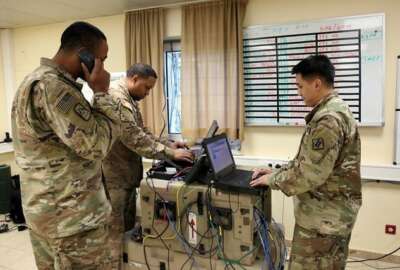

Congress mandated the new office two years ago to drive more consistency into the ways in which the military handles IP rights in its contracts.
The Pentagon will soon stand up a new office within its acquisition bureaucracy to bring more rigor and consistency to how it handles intellectual property in its contract negotiations with vendors.
The new cadre of experts is set to be up and running by October. Their main function will be to develop and update DoD’s policies on data rights, Ellen Lord, the undersecretary for acquisition and sustainment told reporters Tuesday.
“My experience says that typically we have problems with intellectual property when we don’t clearly define what is owned by industry, and what will be owned by government at the outset of a program. So a lot of this really has to do with good program planning,” she said.

Additionally, her office and the new IP group will work on concerns related to intellectual property theft by China’s government.
“Secretary Esper, Secretary Pompeo and the president have all spoken about the impact Chinese intellectual property theft is having on our national security, American commerce and the defense industry,” Lord said. “We need to go on the offense to protect our technology versus merely acting defensively.”
Lord indicated the new department-wide policies would lean heavily on the work the Army did while Esper was Army secretary, a position he left in July when the Senate confirmed him to lead the Pentagon.
Led by Bruce Jette, the service’s assistant secretary for acquisition, logistics and technology, the Army published its first-ever IP policy last December in the form of an Army directive. It told acquisition officials they must be more “sophisticated” customers on the IP front, including by planning for the data right they’ll need for the entire lifecycle of a system at the very beginning of the procurement process, and by communicating its long-term sustainment strategies to vendors early in the acquisition cycle.
“I think we’ve gotten rave reviews across the board because what we try to do is take a very business-like approach to IP,” Esper told Federal News Network in a June interview. “Simple things like deciding which equipment or technology we need the IP for and which we don’t. If we think we want the IP, then how do we work through a market-based solution to get it, whether it’s buying it up front or it’s a royalty-based solution that would endure over time? We bake that into the agreement before we ever begin production.”
DoD is standing up the new intellectual property group two years after Congress ordered it to do so.
As part of the defense authorization bill for fiscal year 2018, lawmakers told the department both to develop an overarching policy for licensing and buying IP, and to create a cadre of data rights experts to help advise the acquisition workforce on how to manage IP in their individual programs.


The law also instructed Lord’s office to create a central point of contact for communication with the defense industry on IP issues.
“As part of such communications, the Department of Defense shall regularly engage with appropriately representative entities, including large and small businesses, traditional and nontraditional government contractors, prime contractors and subcontractors, and maintenance repair organizations,” House and Senate negotiators wrote in a conference report accompanying the bill.
And negotiations over next year’s NDAA show Congress still has an interest in updating DoD’s approach to data rights.
The Senate-passed version of the bill includes language telling the department to launch a pilot program in 2020 that would bring together IP experts from both the government and industry to explore how DoD should value intellectual property in its contract negotiations and source selections.
That provision flowed from one of the recommendations of a Congressionally-mandated advisory group on IP rights in Defense contracts. In its November 2018 report, the Section 813 Panel concluded that too often, DoD insists on a overly-broad data rights in its contracts without giving bidders the flexibility to keep those rights in exchange for other “deliverables” the government might find valuable.
“DoD should not adopt a ‘one size fits all’ approach to intellectual property evaluation in source selections,” panelists wrote. “Clear criteria to meaningfully discriminate between offers using data licenses as an evaluation factor should be provided to offerers, such as reduced cost and schedule of development from commercially available items, or reduced sustainment costs when the government receives sufficient data deliverables and data rights for organic sustainment, the intellectual property valuation techniques used by the government, and the analysis of the effect on cost/price due to the effects on competition caused by increased license requirement. Source selections should be carefully structured to avoid ‘paying more than once’ for the value of intellectual property and should be structured in a way that does not devalue industry’s ability to provide innovative solutions.”
Copyright © 2025 Federal News Network. All rights reserved. This website is not intended for users located within the European Economic Area.
Jared Serbu is deputy editor of Federal News Network and reports on the Defense Department’s contracting, legislative, workforce and IT issues.
Follow @jserbuWFED
